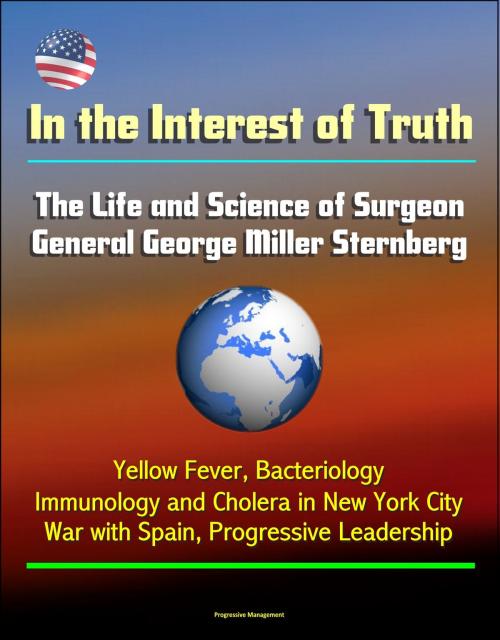In the Interest of Truth: The Life and Science of Surgeon General George Miller Sternberg - Yellow Fever, Bacteriology, Immunology and Cholera in New York City, War with Spain, Progressive Leadership
Nonfiction, Health & Well Being, Health, Ailments & Diseases, Contagious, History, Military, United States| Author: | Progressive Management | ISBN: | 9781311895363 |
| Publisher: | Progressive Management | Publication: | December 13, 2015 |
| Imprint: | Smashwords Edition | Language: | English |
| Author: | Progressive Management |
| ISBN: | 9781311895363 |
| Publisher: | Progressive Management |
| Publication: | December 13, 2015 |
| Imprint: | Smashwords Edition |
| Language: | English |
Professionally converted for accurate flowing-text e-book format reproduction, this excellent book by the U.S. Army is a biography of the life and career of Surgeon General George Sternberg.
Even stripped of the myth and hagiography that characterizes much of what is written about Sternberg and his feats, one is left with an appreciation for his accomplishments during a period of both conventional (American Civil and Spanish-American) and irregular (Indian) warfare, coupled with astonishing advances in science and medicine. A century before human immunodeficiency virus (HIV) disease, pandemic influenza, and emerging infectious diseases spurned by globalization, Sternberg emerged as a national leader in the budding field of bacteriology. He did this while balancing the routine duties of frontier postings and the care of a lean and dispersed Army in the late nineteenth century.
Serving as The Army Surgeon General during the Spanish-American War, Sternberg faced scandal, censure, and overwhelming challenges in the protection of soldiers in a rapidly mobilizing nation with a poorly organized logistics system and a rudimentary notion of preventive medicine. In the face of adversity, Sternberg's keen vision and futuristic focus led him to send the Yellow Fever Commission under Reed to Cuba to resolve the question of the transmission of yellow fever. His leadership ultimately led to control of a disease that not only killed millions of people throughout the western hemisphere and Africa for the previous three centuries but also crippled economies and hampered progress on many fronts. Lessons learned from his leadership—together with parallel work in malaria transmission garnered from the work of Sir Ronald Ross in India and applied to the Isthmus of Panama by William Gorgas—ultimately opened the world to the United States. It changed the course of history.
Today's practitioners of military medicine face devastating blast injuries, traumatic brain injuries, and deadly diseases such as HIV and pandemic influenza—all formidable issues—but Sternberg and colleagues tackled problems that decimated civilian and military populations and crippled the economies of entire countries. Dr. Craig's brilliant text documents Sternberg's heroic efforts to promote health and will be an important resource for future generations of leaders.
Chapter One - Palatines, Pietists, and Medicine * Chapter Two - From First Bull Run to Hospital Command * Chapter Three - The Kansas Plains * Chapter Four - A Career in Medical Science Begins * Chapter Five - Return to the Field * Chapter Six - Debut on the National Stage * Chapter Seven - Exiled to California * Chapter Eight - Dean of American Bacteriology * Chapter Nine - Yellow Fever Investigations * Chapter Ten - Immunology and Cholera in New York City * Chapter Eleven - Surgeon General of the Army * Chapter Twelve - War with Spain * Chapter Thirteen - Empire and Insurrection * Chapter Fourteen - Yellow Fever Loses Its Mystique * Chapter Fifteen - A Proper Progressive in Washington * Epilogue * Acronyms and Abbreviations
Professionally converted for accurate flowing-text e-book format reproduction, this excellent book by the U.S. Army is a biography of the life and career of Surgeon General George Sternberg.
Even stripped of the myth and hagiography that characterizes much of what is written about Sternberg and his feats, one is left with an appreciation for his accomplishments during a period of both conventional (American Civil and Spanish-American) and irregular (Indian) warfare, coupled with astonishing advances in science and medicine. A century before human immunodeficiency virus (HIV) disease, pandemic influenza, and emerging infectious diseases spurned by globalization, Sternberg emerged as a national leader in the budding field of bacteriology. He did this while balancing the routine duties of frontier postings and the care of a lean and dispersed Army in the late nineteenth century.
Serving as The Army Surgeon General during the Spanish-American War, Sternberg faced scandal, censure, and overwhelming challenges in the protection of soldiers in a rapidly mobilizing nation with a poorly organized logistics system and a rudimentary notion of preventive medicine. In the face of adversity, Sternberg's keen vision and futuristic focus led him to send the Yellow Fever Commission under Reed to Cuba to resolve the question of the transmission of yellow fever. His leadership ultimately led to control of a disease that not only killed millions of people throughout the western hemisphere and Africa for the previous three centuries but also crippled economies and hampered progress on many fronts. Lessons learned from his leadership—together with parallel work in malaria transmission garnered from the work of Sir Ronald Ross in India and applied to the Isthmus of Panama by William Gorgas—ultimately opened the world to the United States. It changed the course of history.
Today's practitioners of military medicine face devastating blast injuries, traumatic brain injuries, and deadly diseases such as HIV and pandemic influenza—all formidable issues—but Sternberg and colleagues tackled problems that decimated civilian and military populations and crippled the economies of entire countries. Dr. Craig's brilliant text documents Sternberg's heroic efforts to promote health and will be an important resource for future generations of leaders.
Chapter One - Palatines, Pietists, and Medicine * Chapter Two - From First Bull Run to Hospital Command * Chapter Three - The Kansas Plains * Chapter Four - A Career in Medical Science Begins * Chapter Five - Return to the Field * Chapter Six - Debut on the National Stage * Chapter Seven - Exiled to California * Chapter Eight - Dean of American Bacteriology * Chapter Nine - Yellow Fever Investigations * Chapter Ten - Immunology and Cholera in New York City * Chapter Eleven - Surgeon General of the Army * Chapter Twelve - War with Spain * Chapter Thirteen - Empire and Insurrection * Chapter Fourteen - Yellow Fever Loses Its Mystique * Chapter Fifteen - A Proper Progressive in Washington * Epilogue * Acronyms and Abbreviations















